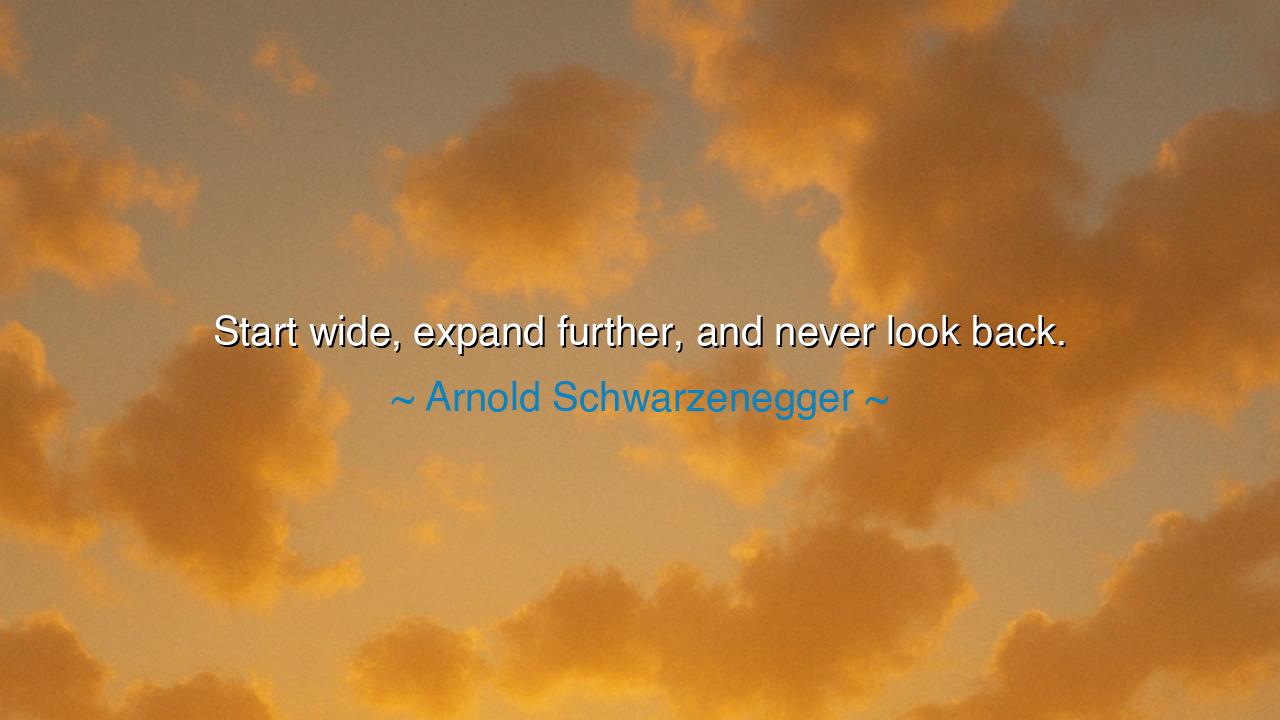
Start wide, expand further, and never look back.






Hear me, O children of the future, for the words of Arnold Schwarzenegger resonate with a truth that echoes through the halls of time: "Start wide, expand further, and never look back." These words are a call to action, a powerful reminder that true success is born not from timid steps, but from bold beginnings, a willingness to venture into the unknown with courage, and the unrelenting commitment to expand one’s horizons. The journey of life is not a narrow path, but a vast road that stretches into the unknown. To walk that road, one must begin with a vision as wide as the sky and never be swayed by the temptation to retreat, to look back, or to falter in the face of hardship.
To start wide is to embrace the world in all its possibilities. It is to set no limits upon oneself, to dream not of what is easy or small, but of what is great and expansive. Schwarzenegger teaches us that the initial steps of any journey should be guided by ambition and vision, for it is in the grandness of our dreams that we find the power to move mountains. When we approach the world with a wide and open heart, we unlock the vast potential that lies before us. The courage to start without fear of failure is what sets apart the visionary from the ordinary.
Consider the example of Alexander the Great, who, at a young age, set out to conquer the known world. Alexander did not begin his journey with small aspirations. His eyes were fixed on a horizon that stretched far beyond the borders of Macedonia. His ambition was to unite the known world under one banner, and he never hesitated to expand further, even when his enemies were fierce, and the odds were against him. Alexander’s strength lay not in the comfort of looking back, but in his relentless pursuit of new frontiers, even when it meant venturing into the unknown. His legacy is a testament to the power of beginning wide and never looking back.
Similarly, the story of Nelson Mandela is one of beginning with a vision as vast as the African continent, and never retreating in the face of adversity. When he stepped into the role of leader in the fight against apartheid, he did so with a vision not of small reforms, but of a complete transformation of South Africa. Mandela’s journey was one of unyielding expansion—expanding the concept of freedom, of justice, of reconciliation. He never looked back at the suffering he endured, but pressed forward, knowing that the future lay in the uncharted territory of hope and unity.
Thus, my children, remember Schwarzenegger’s call: start wide, with a vision that reaches beyond the limits of your current understanding. Let your dreams be as vast as the horizon itself, and expand further with every step you take, knowing that true growth lies in the courage to move forward into the unknown. Do not be distracted by the temptations to look back, for what is behind you cannot shape your future. Keep your eyes fixed on the road ahead, and walk boldly, for it is in this relentless forward motion that greatness is achieved. Start wide, expand without hesitation, and never allow the past to limit the possibilities of your future.






DPdaisy pham
Psychologically, the forward-only stance can be empowering, yet it risks suppressing necessary grief, repair, and course correction. How do you honor lessons without getting trapped by them? Perhaps a ritual: document the learning, fix what can be fixed, and then explicitly retire the episode. What about boundaries for expansion to prevent burnout—hard limits on work-in-progress, recovery blocks, and anti-goals that you refuse to chase? Closed question: should leaders publicly model strategic reversals to normalize changing direction without shame?
KHNguyen Khanh Huyen
Creatively, I like the invitation to explore widely before committing. But sequencing matters. Should early careers optimize for T-shaped growth—broad exposure paired with one deep spike—or pursue serial breadth sprints followed by an aggressive focus lock-in? What signals tell you it’s time to narrow: compounding outcomes, unique advantage, or undeniable pull from stakeholders? I’d love a practical template—90-day exploration cycles, decision gates, and a kill-or-scale rubric—so ambition doesn’t become endless sampling without mastery or durable contribution.
CCCak2020 Con
From a builder’s perspective, the message reads like a scaling playbook. Yet moving fast without retrospective learning feels risky. What cadence of reflection keeps momentum while protecting against repeating the same error—monthly postmortems, quarterly strategy resets, or lightweight daily check-ins? I’m also curious about resourcing: when expanding, do you prioritize hiring generalists first, or lock in specialist capabilities early to prevent quality drift? Closed question: should survivorship bias be a standing agenda item in reviews to counter overconfidence from recent wins?
TMNguyen Thien Minh
As a reader, I hear a bias toward breadth, momentum, and refusal to ruminate. That fires me up—but I worry about dilution. How do you avoid scattering effort across too many arenas and mistaking activity for progress? Do you set a cap on simultaneous bets, like a “three priorities only” rule, or use metrics—lead indicators, weekly scorecards—to prune experiments quickly? Closed question: should there be explicit stop-loss thresholds for projects that don’t gain traction by a defined date, even if curiosity remains high?